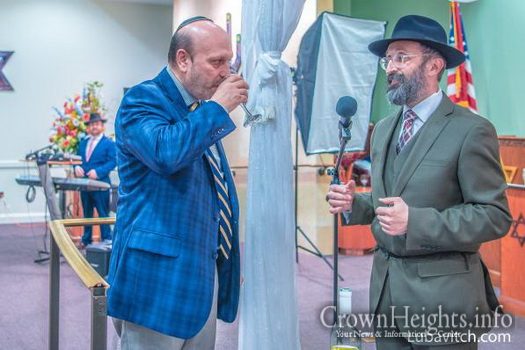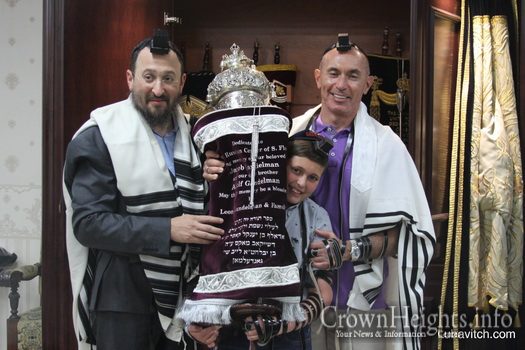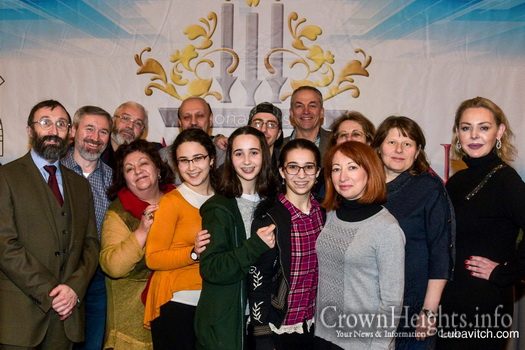
We Fought For Their Freedom, But Where Are Russian-American Jews Today?
by Rena Udkoff – Lubavitch.com
The decline of Jewish engagement is a preoccupying concern of North American Jewish forecasters and leaders. But mainstream Jewish leaders have found that initiatives geared at building numbers and deepening commitment have failed to reach a sizable Jewish demographic that just does not seem to fit the mold.
Thirty years after the first wave of Russian Jews landed on these shores, the babushkas and fur ushankas have disappeared. But the American-born grandchildren of those immigrants still speak Russian with their parents and grandparents. They socialize with friends of Russian background and do so in Russian Jewish enclaves where the food, drink, and music reflect the tastes of their Slavic grandparents.
While members of this community generally embrace their Russian heritage, their relationship with Judaism has proven more complicated. Today, there are 750,000 Russian-speaking Jews in North America. Most, like their American peers, proudly identify as Jewish while living a largely secular lifestyle.
In fact, 73 percent of Russian Jews consider their Jewishness the most important part of their identity. Yet, in comparison to non-Russian Jews, they are significantly underrepresented in synagogue attendance, Jewish philanthropy, and other Jewish institutional staples. Why do Russian-speaking Jews seem so uninterested in American Jewish life and what can we do to better engage them?
Itzik (Izya) Spekterman, of Pikesville, Maryland, arrived in the United States from Moldova in 1990 with his wife and two-and-a-half-year-old son. “My dream for my family was for them to become Americans and forget the troubles of the Soviet Union,” he says. Itzik already had a degree in car design and mechanical engineering, so he took a job as a mechanic and set about establishing a new life for his family.
Growing up in Moldova, Itzik’s family generally observed Jewish traditions, although they never gave him a Jewish education of any kind. When Itzik was thirteen, his father used to wake him up before sunrise and take him to a small underground synagogue to put on tefillin.
Those experiences stuck with Itzik. But once he planted his feet on American soil, Judaism became less important. His first priority was to integrate into his adopted homeland. “Here in the States, everyone can hear my accent right away, and they know I am an immigrant,” he says. “I wanted my children to be recognized as real Americans.” As far as Jewish practice was concerned, Itzik was curious to find out “why we did all that stuff,” but says that he “had no plans to become religious.”
Itzik’s story is a paradigmatic one. Following the fall of the Iron Curtain in 1989, Jews left Russia for the United States and Israel in epic numbers. In the United States, many were drawn to enclaves like southern Brooklyn, where it is still more common to hear Russian than English on the main thoroughfares; others were resettled in major Jewish communities that sponsored their arrival. This exodus was so significant that, nationwide, the number of Russian-speaking Jews in North America probably exceeds the current Jewish population living in Russia and Ukraine combined, according to Dr. Sam Kliger, a sociologist and director of Russian and Eurasian affairs for the American Jewish Committee.
The “organized” resettlement of these Jews throughout the 1980s and early 1990s is one of the American Jewish community’s most significant achievements. The organizations spearheading the refugee aid initiatives, like Hebrew Immigrant Aid Society and Chabad’s Friends of Refugees of Eastern Europe, have been lauded by national Jewish newspapers for their efforts. Since that resettlement, the Russian-American Jewish population has dispersed widely and, in most respects, integrated successfully into their adopted country.
Yet sociologists note that few Russian Jews have chosen to associate with any of the major American Jewish organizations. Instead, they’ve kept to themselves, forming their own communities and continuing to speak Russian to their American-born children and grandchildren.
“The American Jewish community did not do enough to integrate Russian Jews into mainstream American Jewish life,” says Kliger, blaming it on “mutually broken expectations.” He says that “the Russian Jews expected their American brothers to help them with their needs, but organizations viewed them as clients, not partners.” As part of the aid effort, Jewish institutions offered these immigrants jobs as custodians, ignoring the fact that many Russian Jews had PhDs in their home country. And after seventy years of resisting ideological propaganda and developing a pull-yourself-up-by-your-bootstraps mentality, Russian Jews distrusted large institutions and were unfamiliar with philanthropy.
The second generation of Jewish-Russian émigrés have kept their parents’ culture and politics alive. Young Russian-speaking Jews in America tend to be more politically conservative and more pro-Israel than most non-Orthodox Jews. They generally prefer to socialize within their émigré circles and have resisted the widespread American trend of articulating Judaism through “social activism.” And, perhaps most striking of all, they continue to distrust and avoid large Jewish institutions.
“The Conservative and Reform movements were unable to attract Russian Jews,” Kliger says, explaining that to a Jew with a Soviet background, religious practice is generally Orthodox. “When they want to go to a rabbi, they want him to have a beard like the one their grandfather’s rabbi had back in Russia.”
“We did not feel comfortable in any of the local American synagogues,” says Sonia Krichevsky, who immigrated to Cleveland, Ohio, from Ukraine as a five-year-old. “I think it is because they were selling us a package they knew, not a package we knew.” She says that most American Jewish institutions weren’t interested in learning about the Russian-Jewish experience; instead, they wanted to help Russians assimilate into the American Jewish community as quickly as possible. But Russian-Jewish immigrants were proud of their heritage and wanted to preserve their culture. Bagels and lox were no substitute for black bread and herring.
“Chabad was the exception,” Sonia continues, “because they spoke our language. At my parents’ first meeting with the local Chabad rabbi, they reminisced on life back in the motherland and bonded over vodka.”
With a shared history of religious persecution in Russia, Chabad rabbis have a natural kinship with their Soviet brethren and appreciate the cultural distinctions that set this community apart. Chabad was also uniquely positioned to work with Russian Jews in America because they had already begun collaborating in Russia. For seventy years, Chabad operated a vast underground network of rabbis and yeshiva students behind the Iron Curtain, while working to get them out of the Soviet Union.
Rabbi Velvel Belinsky first encountered Chabad rabbis in Leningrad, although he didn’t begin investing in his Jewish identity until after he left the Soviet Union. As a teenager, Velvel dreamed of becoming a scientist, but his priorities changed the day that the rumble of Soviet tanks rattled his bedroom window. He left Russia for safer shores and shifted his focus to Jewish studies.
Today, Velvel leads ARIEL, a Chabad center for the Russian-speaking Jewish community in Pikesville. Russian-speaking Jews make up 15 to 18 percent of Baltimore’s sizable Jewish population, making this one of the largest congregations of Russian Jews in the country.
And Velvel agrees. “Second and third-generation Russian-Jewish immigrants want to be seen as Americans by their American peers,” he says, “but they are also proud Russian Jews. I hear humorous stories from the younger community members about how difficult it is to explain to their friends what it means to be a Russian Jew. Americans think a Russian Jew is someone who’s half Russian and half Jewish. The kids have to say, ‘No, I am fully Russian since my family is from Russia, and I am fully Jewish as my nationality.’”
Americans don’t often appreciate these nuances, and that can be off-putting for Russian-speaking Jews. Mikhael Keifetz, who is a corporate and civil law attorney in Miami, Florida, says that he has been a U.S. citizen for ten years, and feels he is as American as anyone else. “Yet, most Americans do not have the cultural awareness to distinguish me as a Russian-speaking Jew. For them, as soon as they hear my Russian accent, I am a Russian. They do not understand the history behind this broad designation for a persecuted minority, nor the offense it may cause.”
In the U.S.S.R., Mikhael always knew he was Jewish. “I look like a Jew and I walk like Jew,” he says. But his parents told him that practicing Judaism was “not a wise thing to do,” so he never affiliated with the religion. That’s part of why he came to the United States: so that he could freely exercise his religious rights.
Among friends at Chabad, Russian Jews are embraced in all their complexity. For instance, the Chabad-run Mazel Day School in Brighton Beach offers a Russian immersion program. Students study Russian language, literature, poetry, and music, alongside their in-depth Torah and Jewish studies.
But even while embracing the complexity of the American Russian-Jewish experience, Chabad institutions never lose sight of their core values. As a father of two daughters, ages seven and nine, Mikhael says, “It is not important to me to instill in them an American identity, because they are growing up in this society. They know they are Americans. I need to make sure they know they are Jewish.” The girls attend Chabad’s Hebrew school every Sunday where they learn with other children of Russian-Jewish descent.
What’s perhaps most surprising about young Russian Jews is that, despite their identity crisis, they intermarry far less than the generations that came before them. But Dr. Sam Kliger says that this trend may be circumstantial rather than ideological—that it has more to do with social habits than philosophy. And Chabad rabbis agree that more work must be done to highlight the importance of marrying Jewish.
Evelyn Raynshteyn, a nurse in Southern Florida who was only two years old when her parents immigrated to the Bronx, New York, in 1975, is the only one of all her cousins who married Jewish. The reality saddens her. “I feel very sad for my great uncle, who has no Jewish great-grandchildren,” she says. “It seems like everything they suffered through and survived has been erased, and generations of sacred traditions have been lost.” That dynamic motivates her to instill a stronger sense of Jewish identity in her tenth-grade son, whom she encourages to volunteer at Chabad.
Alex Kaller predicts that while some parts of Russian-Jewish culture will disappear with the first generation of immigrants, the language, food, and unique traditions will live on for many years to come. But for him and other Chabad rabbis, what’s most urgent is nurturing the Jewish part of this community’s identity. “This is a difficult demographic to reach, but we’ve seen that by embracing all aspects of their layered Russian-American-Jewish identity, and offering welcoming, judgment-free Jewish experiences, they will get involved.”
Dr. Kliger has been attending a Chabad synagogue in Brighton Beach for thirty-five years and has observed young Russian-speaking Jews engaging with Judaism that is “made accessible, open-minded, and hands on. They do not want to be told what to do but have shown themselves very receptive,” observes the sociologist, “to Chabad’s inspired reminders of who we are. We are Jewish.”




















NoYechi770InJerusalem
My family is from Russia & I speak very little Russian & more English,Yiddish & Hebrew.
I can’t even read or write Russian only Yiddish,English & Hebrew.